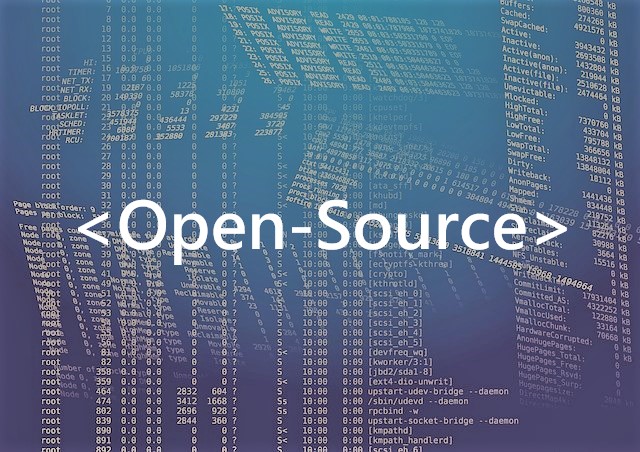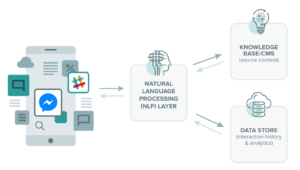Free and open-source software (FOSS) has completely shaken up the software development and business worlds. Instead of relying on huge companies to fix bugs when they appear, you have access to the source code yourself and can make any change you need to. When a proprietary software vendor goes out of business, all of their customers are out of luck—but with open-source software, you can make a fork to maintain yourself or join the community’s effort to keep the software running.
Chatbots are no different. Using software that you can modify, extend, and redistribute for free is a huge boon to productivity, an easy way to save a lot of money in licensing fees, and insurance against any negative changes from the vendor or licensing model. Chatbots oftentimes require extensive customization to meet business needs, so it’s great to not have to wait for the vendor to implement your changes.
Large companies oftentimes want support contracts and the ability to let another company take care of deployment, maintenance, and security. It’s a common misconception that open-source software means that you have to run the whole thing yourself—in fact, you can oftentimes purchase support from the developers or a third party the same way you would with proprietary software. This is the business model of companies like Red Hat: they sell support for their customized Linux distribution, built from open-source components, to companies that need the assurance of a support contract. The availability of the source code means that many more people have expertise in troubleshooting and maintaining it. Plus, developers are more likely to have played with free and open source software at previous companies or on their own time, meaning that you will have to spend less time getting them up-to-speed.
For the individual or small community users of FOSS, the democratization of access to powerful software tools makes money no longer such a challenge. Aside from the source code, there’s oftentimes plenty of knowledge about a specific piece of FOSS online that there wouldn’t be for proprietary software. Anyone can use and contribute to free software, which makes it hugely beneficial to those who wouldn’t be able to afford comparable proprietary software.
Regardless of who you are and what your goals are, using open-source software makes your life easier. From support of old versions to customizations to security auditing, many facets of software usage (and certainly software development) are easier when the source is available to everyone.
Open-source chatbot technology makes debugging and deployment simple
E.D.D.I from Labs.ai is an open and user-controlled solution in a field full of secretive and expensive alternatives. Although those proprietary technologies are powerful and relatively easy to develop with, the AI software itself is a black box. If something doesn’t work as expected for your business application, you can’t take a look inside to figure out what went wrong. You’re at the mercy of the company that developed the software.
Even worse, many of these proprietary packages run exclusively on the provider’s cloud infrastructure. This means that your interface with the system is nothing more than a few kinds of API calls. Any kind of advanced profiling or debugging on this type of software is impossible. Want better reliability by hosting on multiple cloud platforms simultaneously? With proprietary software, you’d be out of luck.
Open-source technology is different in this regard. When something breaks, you have the ability to debug it yourself, on your own hardware (or in the cloud), with access to the source code. You are free to run the software on whichever cloud provider you prefer (or on-premises). By using standardized containerization technology like Docker, there’s nothing locking you into one provider.
FOSS saves you money in the long run
When proprietary software vendors lock your company into their specific cloud infrastructure and their proprietary technology, you can’t do anything about price hikes or changes in licensing. With open source software, you can just move your containers over to another provider whenever you want.
Similarly, support packages for open-source software are usually far less expensive than those for proprietary software. Since the developers no longer have a monopoly on knowledge about the product, they cannot charge exorbitant amounts of money for support. Plus, just like with infrastructure, you can oftentimes choose between a variety of different organizations for support.
Open-source software opens up entirely new possibilities
Chatbots can be used for so many purposes, many of which have yet to be completely explored. Proprietary chatbot vendors generally have optimized their offerings to a few particular applications. This way, they can have impressive technological demos and compete very well in the specific categories their software is optimized for.
While open-source chatbots might also be optimized for specific use-cases, the availability of their source code makes it possible to add on additional functionality for brand new uses. This is simply not possible without this kind of access. To achieve this with a proprietary chatbot, you’d need to pay the vendor a lot of money to implement the features you were looking for.
—————–
The prevalence of open-source software in today’s world has greatly improved individuals’ access to cutting-edge technology. It has also made it easier for companies to build software that meets their requirements using reusable open source components. Additionally, it has given power back to the users of software instead of to the vendors. In the realm of chatbots, an open source framework makes building, deploying, and maintaining chatbot solutions easier and less expensive.



